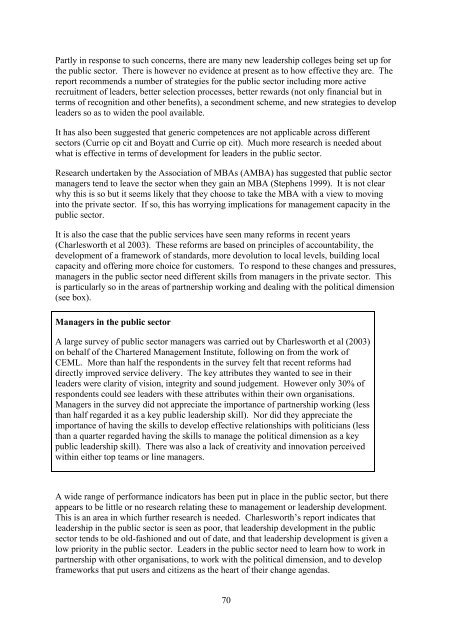The Development of Management and Leadership Capability and its ...
The Development of Management and Leadership Capability and its ...
The Development of Management and Leadership Capability and its ...
You also want an ePaper? Increase the reach of your titles
YUMPU automatically turns print PDFs into web optimized ePapers that Google loves.
Partly in response to such concerns, there are many new leadership colleges being set up for<br />
the public sector. <strong>The</strong>re is however no evidence at present as to how effective they are. <strong>The</strong><br />
report recommends a number <strong>of</strong> strategies for the public sector including more active<br />
recruitment <strong>of</strong> leaders, better selection processes, better rewards (not only financial but in<br />
terms <strong>of</strong> recognition <strong>and</strong> other benef<strong>its</strong>), a secondment scheme, <strong>and</strong> new strategies to develop<br />
leaders so as to widen the pool available.<br />
It has also been suggested that generic competences are not applicable across different<br />
sectors (Currie op cit <strong>and</strong> Boyatt <strong>and</strong> Currie op cit). Much more research is needed about<br />
what is effective in terms <strong>of</strong> development for leaders in the public sector.<br />
Research undertaken by the Association <strong>of</strong> MBAs (AMBA) has suggested that public sector<br />
managers tend to leave the sector when they gain an MBA (Stephens 1999). It is not clear<br />
why this is so but it seems likely that they choose to take the MBA with a view to moving<br />
into the private sector. If so, this has worrying implications for management capacity in the<br />
public sector.<br />
It is also the case that the public services have seen many reforms in recent years<br />
(Charlesworth et al 2003). <strong>The</strong>se reforms are based on principles <strong>of</strong> accountability, the<br />
development <strong>of</strong> a framework <strong>of</strong> st<strong>and</strong>ards, more devolution to local levels, building local<br />
capacity <strong>and</strong> <strong>of</strong>fering more choice for customers. To respond to these changes <strong>and</strong> pressures,<br />
managers in the public sector need different skills from managers in the private sector. This<br />
is particularly so in the areas <strong>of</strong> partnership working <strong>and</strong> dealing with the political dimension<br />
(see box).<br />
Managers in the public sector<br />
A large survey <strong>of</strong> public sector managers was carried out by Charlesworth et al (2003)<br />
on behalf <strong>of</strong> the Chartered <strong>Management</strong> Institute, following on from the work <strong>of</strong><br />
CEML. More than half the respondents in the survey felt that recent reforms had<br />
directly improved service delivery. <strong>The</strong> key attributes they wanted to see in their<br />
leaders were clarity <strong>of</strong> vision, integrity <strong>and</strong> sound judgement. However only 30% <strong>of</strong><br />
respondents could see leaders with these attributes within their own organisations.<br />
Managers in the survey did not appreciate the importance <strong>of</strong> partnership working (less<br />
than half regarded it as a key public leadership skill). Nor did they appreciate the<br />
importance <strong>of</strong> having the skills to develop effective relationships with politicians (less<br />
than a quarter regarded having the skills to manage the political dimension as a key<br />
public leadership skill). <strong>The</strong>re was also a lack <strong>of</strong> creativity <strong>and</strong> innovation perceived<br />
within either top teams or line managers.<br />
A wide range <strong>of</strong> performance indicators has been put in place in the public sector, but there<br />
appears to be little or no research relating these to management or leadership development.<br />
This is an area in which further research is needed. Charlesworth’s report indicates that<br />
leadership in the public sector is seen as poor, that leadership development in the public<br />
sector tends to be old-fashioned <strong>and</strong> out <strong>of</strong> date, <strong>and</strong> that leadership development is given a<br />
low priority in the public sector. Leaders in the public sector need to learn how to work in<br />
partnership with other organisations, to work with the political dimension, <strong>and</strong> to develop<br />
frameworks that put users <strong>and</strong> citizens as the heart <strong>of</strong> their change agendas.<br />
70
















